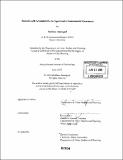Flexibility with accountability : an experiment in environmental governance
Author(s)
Amengual, Matthew
DownloadFull printable version (10.03Mb)
Other Contributors
Massachusetts Institute of Technology. Dept. of Urban Studies and Planning.
Advisor
David Laws.
Terms of use
Metadata
Show full item recordAbstract
Command and control environmental regulation has been under attack from all sides for some time. In Wisconsin, the Department of Natural Resources is experimenting with an alternative form of environmental governance. This new program uses cooperative agreements to provide flexibility to firms in exchange for "superior environmental performance." The program attempts to change norms of adversarial and rule driven regulation, to norms of cooperative and flexible regulation. To maintain democratic accountability, firms that take part in the program are required to create a group of interested community participants. This thesis explores regulatory relationships within this program and under command and control through three case studies. These case studies reveal that flexibility can provide opportunity for greater environmental performance and that bottom up participation can provide a measure of democratic accountability. However, this democratic accountability was compromised by lack of access to expertise among participants, lack of clarity in roles, and difficulty handling conflict. The difficulties faced in this program highlight the need for the state to take a proactive role even when moving away from command and control. Nevertheless, these cases show potential for a shift towards cooperation in regulation through opening spaces for firms, regulators, and communities, to engage in deliberation.
Description
Thesis (M.C.P.)--Massachusetts Institute of Technology, Dept. of Urban Studies and Planning, 2005. Includes bibliographical references (leaves 174-177).
Date issued
2005Department
Massachusetts Institute of Technology. Department of Urban Studies and PlanningPublisher
Massachusetts Institute of Technology
Keywords
Urban Studies and Planning.